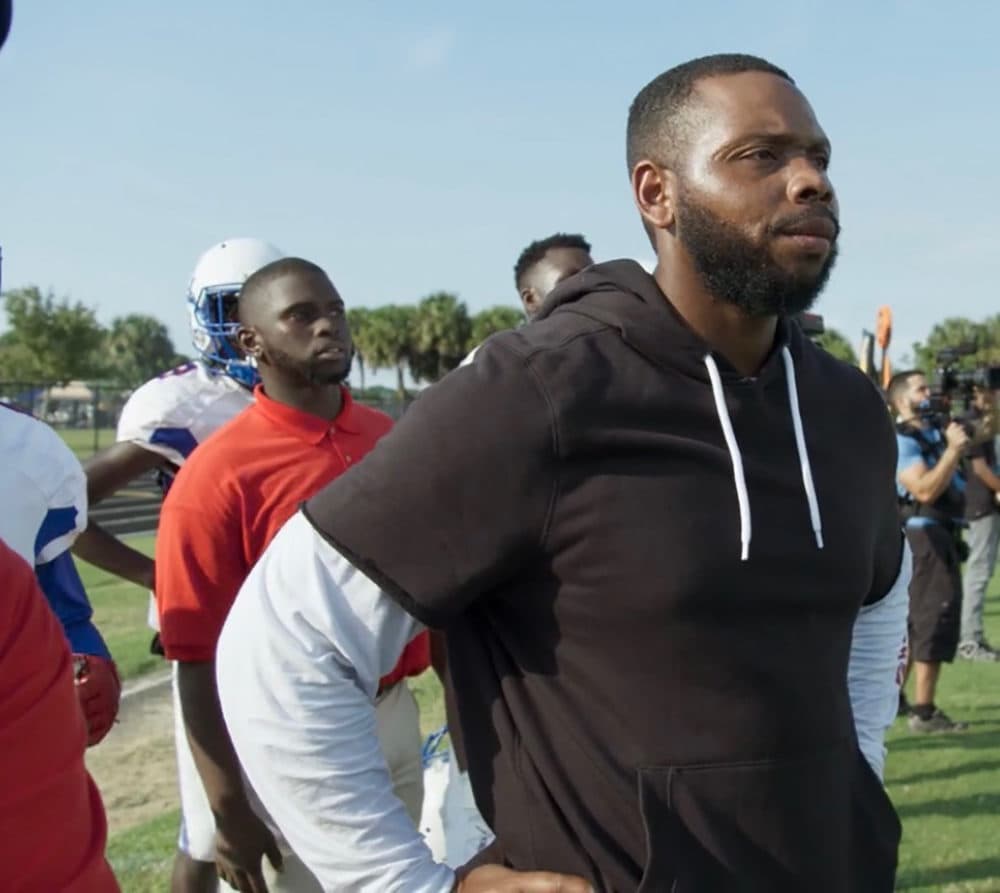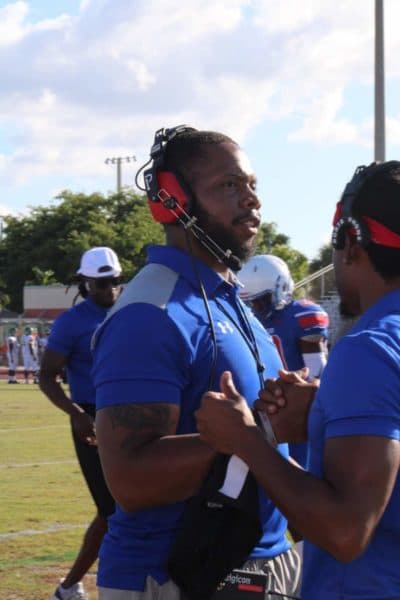Advertisement
For A Florida H.S. Football Coach, Police Brutality Hits Close To Home

Among the many athletes speaking out this week is former NFL Pro Bowler Anquan Boldin.
For Boldin, speaking out is nothing new. In 2017, along with Saints defensive back Malcolm Jenkins, Boldin founded the Players Coalition, which works with state and local governments to end systematic oppression. And that same year, after a 14-year career, Boldin retired from the NFL to focus on his activism full-time.
But Anquan Boldin’s younger brother, DJ, is just starting to speak out. And he started with the football players he coaches at Pahokee High School in Florida. Due to the COVID-19 pandemic, DJ couldn’t speak to his players in person, so he sent them a note on Twitter.
DJ Boldin joined us this week on Only A Game.
KG: I want to start with the note you sent out to your players earlier this week. What made you decide to reach out to them?
DB: To be honest, Karen, a lot of things have been going through my mind. And it dawned on me that I had a responsibility as a coach to say something. We tell parents, you know, "I'm gonna take care of your kid. I'ma treat him as if he's one of my own." If that's the case, then you have to have these discussions. If they feel half of what I feel, they have to be confused. They have to be going through a turmoil of emotions. And it’s my job as the adult, as the mentor figure, as the head coach figure, to address it.
KG: Tell me about your players. Who are they? What kind of backgrounds do they come from?
DB: My team is comprised of 90-some percent African American, and the other small percentage Latino. So obviously, all of the kids look like me, if you will. And they are probably gonna face the same profiling and, you know, all the other stuff that goes along with the color of my skin. On top of that, it's a rural area — I mean, just a little over 4,000 people in the entire city. Low socio-economical class, Section 8 housing, food stamps. We don't have a chain restaurant. We don't have a chain grocery store. There is no outlets for kids to be kids, meaning: no skating rink, no bowling alley, no movie theater. You know what I'm saying? So these kids already face a lot just from life itself. So, to add more fuel to the fire, if you will, and show them racism and to put it in their face that, "Yeah, you are different," I think that's a slap in the face to the kids.
"These kids already face a lot just from life itself. So to ... show them racism and to put it in their face that, 'Yeah, you are different,' I think that's a slap in the face to the kids."
DJ Boldin
KG: So you also grew up in this same small town where you now teach U.S. and world history and coach football. You played on the Pahokee High football team. And then you went on to play at Wake Forest University. And you've said football shields you. How so?
DB: Football, man, it's a brotherhood. Obviously, you see people of all nationalities, of all colors, of all socioeconomic backgrounds. The guy next to you is the guy you have to depend on. It's kind of one of those things where everybody has to trust everybody. So there's no room for, you know, the separation of race. Once you get outside of the realm of football, you have to face reality. And the reality is what we've been seeing over the last few days.
KG: In 2015, your family suffered quite a tragedy. Tell me about your cousin Corey Jones. Who was he, and how did he die?
DB: Oh, my gosh. Corey is an angel now. He's always been an angel. Corey was always that relative that was supportive. He was a character. He likes to crack jokes. You know, he loves to laugh. And he loved music. I mean, his life was pretty simple. You know, he stayed around the church. His grandfather is the bishop of our ministry. And he played the drums for his grandfather. He used his gift and skill of playing drums to earn a living.
And that night when he was, you know, taken away from us, he was coming from a gig. You know, he had performed, he broke down on the side of the road. While he was waiting for roadside assistance, I mean, the audio tape speaks for itself. An unmarked police officer came on the scene, never addressed who he was, but asked Corey did he need help. Corey was like, "I'm good."
Corey started to flee, and as he was fleeing, he was shot multiple times and killed. That was very dark moment for a lot of us and our family because it happened to a guy that did nothing wrong. I would have rather it been me. I haven't led a perfect life, you know, and I'm not saying he's perfect at all. But, you know, what meets the eye is a guy that was a genuinely good person, and everybody that he's ever came encountered with will say the same thing.
KG: And in Corey's case, the police officer who killed him was convicted and sent to jail. Does that help at all?
DB: No, no, and I'ma tell you why it doesn't help. Yes, it's some type of vindication. It's an anomaly, if you will. It's one victory versus thousands of losses. And my family still grieves with the nation. Like, yes, the officer is paying for his crimes, but he — the officer has left a residue, if you will, of guys that do the same thing that he's done.
KG: So every time you hear that this has happened again, as it did recently with George Floyd, what's that like for you?
DB: It's like a knife just that's already in your back just going an inch deeper. It can happen to me. It really can happen to me. And I like to believe that I'm a great guy. You know, I like to believe I'm a great coach. I like to believe I give love. I sacrifice. I give my time. Yes, I have tattoos. Yes, I'm a big black guy. Yeah, I've got a full beard. I probably do look intimidating to some people, but it's a sad reality that that can be me for no reason. I pray to God that it doesn't happen to another one of my family members, yet alone my own children.
"It's a sad reality that that could be me for no reason. I pray to God that it doesn't happen to another one of my family members, yet alone my own children."
DJ Boldin
KG: In your note to your players, you didn't expressly mention your cousin. Am I right in assuming that's a story they already know?
DB: Yes. You know, everybody knows about the situation. I believe that's why the message probably touched the hearts of my kids so well because they already know what we've been through.
KG: So how did your players respond to your note?
DB: So I've coached in the NFL, and I've coached in very different high schools. This kid that I coached in Memphis, Tennessee, at St. Benedict of Auburndale — it's a private Catholic school. He's a Jewish kid. He's one of my favorite kids in the entire world. And one day I told him, "Hey, man, I can see you being the president in one day." And he laughed. He's like, "Coach Boldin, first of all, how many Jewish presidents do you know?" I was like, "I know. I know. You know, you can actually be the first, you know?" And he's like, "Ahh, Coach Boldin, you're crazy. I'm not politics. I'm not politics." And after I posted that message, he texts me at 1 o'clock in the morning. He says, "Stuff like what's going on right now really makes me consider when you tell me to run for office."

This is such a gratifying moment because I preach a lot to my kids. You get two lives to live. You get the football life and you get to real-world life. And I use my brother Anquan a lot. He had a 14-year career. Right? Very successful NFL career. And he retired at, what, 35, 36? You know, statistic has it, you're supposed to retire at 65. So you talk about 30 more years of life to try and figure out. And, you know, Anquan is doing a great job integrating back into the real world. But I can guarantee you the first couple years of his retirement, he didn't know what he was going to be doing. He probably still don't know. And I believe what he's doing with the justice reform and the NFL Players Coalition, it is pushing him in the direction of his path. But right now, he's a normal American citizen that has to figure out life. Now, you take this one kid that I coached at 16 years old — already knows what he you want to do in life. He's already the future. That's what our job is as head coaches: to prepare the next generation of kids to be better than what we were.
Advertisement
KG: When you finally do get a chance to see your players in person again, how do you intend to keep this conversation going?
DB: I hope that they have more questions for me than I have answers. It's just going to force me to be more vulnerable to my kids. And I believe when you are vulnerable to kids and you show them and tell them the truth, the bond grows stronger. The trust grows stronger. And hopefully with that approach, you know, I can make them a better human being — not a better football player, but just a better human being, once this is all said and done.
KG: Protests this week have spread from Minneapolis to around the country and even the world. What do you hope comes out of this movement?
DB: I see this whole process as a grieving process. If you lose a loved one, no one can tell you how to grieve, right? It's just a whirlwind of emotions, of outcry and just actions that probably don't make sense to a lot of people. But it makes sense to you. After everybody heals from the mourning, it's so important for them to educate themselves and to take action. And I'm speaking to me first. You know, I'm speaking to me first. I'm already registered to vote. I'm already educating myself on the mayor, the commissioner, the district attorneys. If the people of this country do not educate themselves and if they don't go out and vote, all of this would be for nothing. Period.
DJ Boldin coaches football and teaches history at Pahokee High School in Florida.
This segment aired on June 6, 2020.

